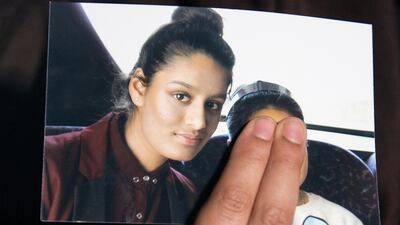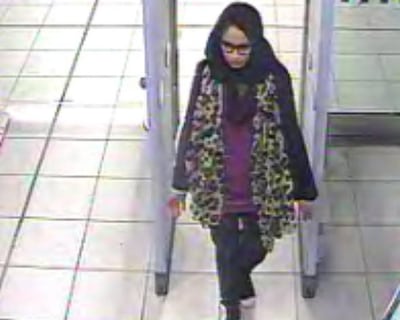Shamima Begum, the woman who left the UK when she was 15 to join ISIS, is barred from returning to fight the government's decision to strip her of citizenship, Britain's highest court ruled on Friday.
The government blocked the return in 2019 of Ms Begum, now 21, claiming that she was a threat to national security and exposed the public to a greater risk of terrorism.
Ms Begum travelled with two schoolgirls from Bethnal Green Academy in east London, to Raqqa, Syria, in February, 2015.
She married Dutch convert Yago Riedijk shortly after arriving in ISIS territory and the couple had three children, all of whom died in infancy.
They lived in the ISIS stronghold of Raqqa for about four years before the group lost its grip on territory and she ended up in the Al Roj migrant camp where she is being held in dire conditions by the Syrian Democratic Forces.
She wanted to return to Britain but Sajid Javid, who was home secretary at the time, removed her citizenship to block her return.
Ms Begum won a significant victory in an appeal against the decision in July last year, prompting the government to seek a ruling from the country's highest court.
Overturning the decision, Lord Reed, the president of the Supreme Court, said it “allows all of the home secretary's appeals” and that the previous ruling had made four key errors.
The judgment said the court had not properly addressed security concerns if Ms Begum was allowed to return to Britain. The assessment of the home secretary did not get “the respect which it should have received” given that he had responsibility for such decision-making.
Ms Begum was seen wearing western clothes at the Al Roj camp on Friday but declined to comment on the decision to broadcaster ITV.
Mr Javid welcomed the ruling and said any restriction on rights and freedoms was a "direct consequence of the extreme actions that she and others have taken".
British Prime Minister Boris Johnson on Friday hailed the decision.
"We are pleased with the Supreme Court's unanimous decision. As we've said before the government's priority is maintaining our national security and decisions to deprive individuals of their citizenship are not taken lightly," he said.
"We will always ensure the safety and security of the UK and will not allow anything to jeopardise this."
But rights groups and MPs from the ruling Conservative party warned that the failure to repatriate foreign fighters and their associates could make them more dangerous.
"It is of course tempting to wash our hands of these people," former minister Andrew Mitchell wrote in The Telegraph. "But banning them from Britain or stripping them of citizenship won't make them go away. It may mean we lose track of them altogether."
Ms Begum, Kadiza Sultana, 16, and Amira Abase, 15, boarded a flight from London Gatwick Airport to Istanbul, Turkey, on February 17, 2015, before making their way to Raqqa. The three girls left only months after a school friend travelled to Syria.
In 2019, Ms Begum told The Times newspaper that she did not regret travelling to Syria and was unfazed at seeing a severed head dumped in a bin.
The age of the travellers sharpened focus on efforts to prevent disaffected British Muslims from leaving the country to join ISIS amid fears of a generation of Britons becoming radicalised.
A number of fighters had their citizenship revoked as a dispute between countries continues over how best to handle ISIS activists still alive after defeat on the battlefield.
About 20 British families are in detention camps in north-east Syria, including a number of children, human rights NGO Reprieve said.
Its director Maya Foya said that barring Ms Begum from the UK was a "cynical ploy to make her someone else's responsibility".
"Like many of its European counterparts, the UK is more than capable of bringing home British detainees in Syria, many of whom left as teenagers after being trafficked or groomed online," she said.
Ms Foya said that British policy was increasingly at odds with its allies, with the US repatriating 28 of its nationals from camps in northern Syria.
Ms Begum's husband, who was last year being held in a Kurdish detention centre in north-east Syria, said he wanted to return to the Netherlands with his wife.



